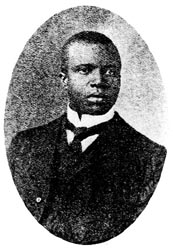Ragtime Archaeology:
Excavations in Scott Joplin's Neighborhood

In 1984, Missouri State Parks acquired the last standing house or structure associated with Scott Joplin, known as the "King of Ragtime," in St. Louis and created the Scott Joplin House State Historic Site. Efforts by Jeff-Vander-Lou, Inc., a local African-American neighborhood organization, had previously saved this home from destruction and had it recognized as a National Historic Landmark site in 1976. At the turn of the century, Joplin moved from Sedalia, Missouri to St. Louis and rented the second-floor flat of this brick row house to be closer to his publisher and to the center of ragtime music. He only lived at this address for a short period between 1900 and 1903 with his first wife, Belle.
By this time, Joplin was already a well-known composer with his earlier publication of the Maple Leaf rag in 1899, which eventually sold over 500,000 copies (Berlin 1994; Curtis 1994). In St. Louis, Joplin focused on composing new rags and teaching, spending little time performing. One of his published works that was written in this house wasThe Entertainer, which was popularized again by the 1973 Paul Newman and Robert Redford movie, The Sting.
Since 1984, the Scott Joplin House State Historic Site has acquired adjacent buildings and vacant property as a buffer zone around the site and for potential future development and interpretation. For example, in the early 1990s the New Rosebud Cafe was opened in the adjacent property for receptions, ragtime performances, and parties. This venue was designed to mimic the Rosebud Bar, a historic rag joint in St. Louis operated by Tom Turpin. In 1897, Turpin was the composer of the first published rag, called the Harlem Rag (Jones 1995). In the early 1900s, the original Rosebud was located only eight blocks south of Joplin’s home and was at the center of St. Louis' African American community and Rag music nationally.
The interpretation of Scott Joplin's house has focused on the celebratory history of Scott Joplin and ragtime music. This site serves an important role in the Missouri State Parks because it is the only site dedicated to African-American heritage and located within a large urban context. [Read or download this full article here in Adobe .pdf format >>>].

No comments:
Post a Comment